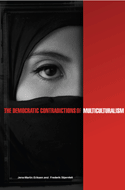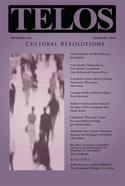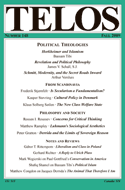By Telos Press · Monday, December 30, 2013  Congratulations to Jens-Martin Eriksen and Frederik Stjernfelt for winning best title in the non-fiction category at the London Book Festival for their book The Democratic Contradictions of Multiculturalism, published by Telos Press. Congratulations to Jens-Martin Eriksen and Frederik Stjernfelt for winning best title in the non-fiction category at the London Book Festival for their book The Democratic Contradictions of Multiculturalism, published by Telos Press.
Congratulations in the same category to Timothy W. Luke and Ben Agger, who received Honorable Mention for their anthology A Journal of No Illusions: Telos, Paul Piccone, and the Americanization of Critical Theory.
The awards will be presented at the British Library on January 23, 2014.
To celebrate the awards, we’re offering a 20% discount on both books when purchased at our online store through the end of January.
Continue reading →
By Jens-Martin Eriksen · Thursday, July 18, 2013 Jens-Martin Eriksen’s “Culturalism: When the Culture becomes Political Ideology” appears in Telos 163 (Summer 2013). Read the full version online at the Telos Online website, or purchase a print copy of the issue in our store. Eriksen and Stjernfelt’s The Democratic Contradictions of Multiculturalism is also available here.
 The political critique of modernity has gained momentum in Europe in recent years. It is a diverse movement, encompassing populist nationalist and national-conservative parties in Western Europe, a fascistoid Christian-nationalist revival—and on the opposite side: Islamism and the people they instrumentalize, the multiculturalists. They all agree that politics should focus primarily on culture and religion, and all other fields of operation depend on these aspects being stable and undisturbed and not influenced by other trends in society. The dogma that individuals from different groups should not mix is widely accepted and a de facto apartheid is more or less implemented in Western Europe by the civil society. The physical segregation in the cities and in public schools is a fact. The political power play is for the moment over signs and political symbols—e.g., the referendum in Switzerland about the prohibition of minarets, the ban on religions symbols in public schools in France, and other initiatives. The Left seems dazed and confused in this battle and unable to calibrate how to meet the challenge. The political critique of modernity has gained momentum in Europe in recent years. It is a diverse movement, encompassing populist nationalist and national-conservative parties in Western Europe, a fascistoid Christian-nationalist revival—and on the opposite side: Islamism and the people they instrumentalize, the multiculturalists. They all agree that politics should focus primarily on culture and religion, and all other fields of operation depend on these aspects being stable and undisturbed and not influenced by other trends in society. The dogma that individuals from different groups should not mix is widely accepted and a de facto apartheid is more or less implemented in Western Europe by the civil society. The physical segregation in the cities and in public schools is a fact. The political power play is for the moment over signs and political symbols—e.g., the referendum in Switzerland about the prohibition of minarets, the ban on religions symbols in public schools in France, and other initiatives. The Left seems dazed and confused in this battle and unable to calibrate how to meet the challenge.
Continue reading →
By Telos Press · Monday, May 6, 2013 Save 20% when you purchase at telospress.com
 The Democratic Contradictions of Multiculturalism, by Jens-Martin Eriksen and Frederik Stjernfelt, is now on sale in the Telos Press store. Purchase it here and save 20% off the list price! The Democratic Contradictions of Multiculturalism, by Jens-Martin Eriksen and Frederik Stjernfelt, is now on sale in the Telos Press store. Purchase it here and save 20% off the list price!
What is multiculturalism? Is it every person’s right in a democratic society to choose his or her religion and culture and to express criticism regardless of taboos and moralistic norms? Or is it the right of cultures and religions to be protected from insult and to preserve themselves against change? Jens-Martin Eriksen and Frederik Stjernfelt examine the ideology and the reality of multiculturalism, including the Muhammad cartoons, laws against blasphemy, hijab, the Islamic ban on apostasy, and the limits of the freedom of religion.
Continue reading →
By Michael Millerman · Tuesday, April 30, 2013 As an occasional feature on TELOSscope, we highlight a past Telos article whose critical insights continue to illuminate our thinking and challenge our assumptions. Today, Michael Millerman looks at Frederik Stjernfelt’s “Secularism is Fundamentalism! The Background to a Problematic Claim,” from Telos 148 (Fall 2009). Frederik Stjernfelt and Jens-Martin Eriksen’s The Democratic Contradictions of Multiculturalism is also available from Telos Press in our online store.
 What Leo Strauss demonstrated in his studies on the foundations and crisis of liberalism—an achievement that continues to bring both honor and infamy to his name—recurs in the guise of an unsolved problem in both the popular press and in learned company as a debate over the question of whether secularism is what it ostensibly opposes: a rigid fundamentalism. In these circles, the question is provoked less by purely theoretical considerations than by such utterances in the public sphere as are bound to infuriate a sect’s opponents, or confirm them in their suspicions: the Christian American Family Association‘s director of issues analysis refers to “secular fundamentalists” as “the American Taliban”; Quebec Cardinal Marc Oullet, who had a chance to become Rome’s new Pope, complains of “secular fundamentalism” and the “dictatorship of relativism” when defending the Catholic faith; the inquisitor Simon Blackburn quips that a recent book by an established and respected philosopher, who questions the materialistic atheism of the day, ought to be blacklisted as prohibited reading. What Leo Strauss demonstrated in his studies on the foundations and crisis of liberalism—an achievement that continues to bring both honor and infamy to his name—recurs in the guise of an unsolved problem in both the popular press and in learned company as a debate over the question of whether secularism is what it ostensibly opposes: a rigid fundamentalism. In these circles, the question is provoked less by purely theoretical considerations than by such utterances in the public sphere as are bound to infuriate a sect’s opponents, or confirm them in their suspicions: the Christian American Family Association‘s director of issues analysis refers to “secular fundamentalists” as “the American Taliban”; Quebec Cardinal Marc Oullet, who had a chance to become Rome’s new Pope, complains of “secular fundamentalism” and the “dictatorship of relativism” when defending the Catholic faith; the inquisitor Simon Blackburn quips that a recent book by an established and respected philosopher, who questions the materialistic atheism of the day, ought to be blacklisted as prohibited reading.
Continue reading →
By Göran Dahl · Friday, October 12, 2012 Jens-Martin Eriksen and Frederik Stjernfelt’s The Democratic Contradictions of Multiculturalism, reviewed in this essay, is available for purchase here.
I cannot refrain from first saying that this is a must read-book. That goes for those who are critical of “multiculturalism”—whatever this means—and for those wanting to defend it.
 Let us begin the central concept in this book—multiculturalism. I have, when confronted with the word, been wondering if the one who utters it is referring to an ideological ideal or a state of affairs. The authors use a similar distinction: multiculturalism is confusing since it is often not clear what is meant. It can be either an existing condition or a coming condition. This kind of use is descriptive. Then we have the normative one: a necessary way to think and act in a society when we have different (most often) ethnically based communities with different ideas on what is right or wrong. Just remember the Danish Mohamed cartoons from some years ago, and now recently the short film ridiculing “the prophet” available on YouTube. All of this has led to a discussion of whether there should be limits on free speech that involves ironies, jokes, pictures, etc., that could make religious believers feel insulted. The objection of many others, including me, is that in a modern, western liberal democracy one can say or illustrate any religious matter in whatever way you want. The public sphere is totally secular, or at least it should be so.[1] If you feel insulted, this is a private reaction, outside the public sphere. The bottom line would then be very simple: the public sphere gives anyone the right to argue his or her opinion, while civil society is the sphere of emotions. As long as these emotions remain just emotions, there is no problem. But the reason why this is an important book is that we have seen the emergence of leaders in the west who have considered limitations regarding free speech so that no minority gets insulted. If we follow this logic to its conclusion, then cartoons illustrating stereotypes of men, for example, should also illegal. A related problem is self-censorship, which many modern writers and artists have admitted suffering from. So the problem starts to get very complicated. Let us begin the central concept in this book—multiculturalism. I have, when confronted with the word, been wondering if the one who utters it is referring to an ideological ideal or a state of affairs. The authors use a similar distinction: multiculturalism is confusing since it is often not clear what is meant. It can be either an existing condition or a coming condition. This kind of use is descriptive. Then we have the normative one: a necessary way to think and act in a society when we have different (most often) ethnically based communities with different ideas on what is right or wrong. Just remember the Danish Mohamed cartoons from some years ago, and now recently the short film ridiculing “the prophet” available on YouTube. All of this has led to a discussion of whether there should be limits on free speech that involves ironies, jokes, pictures, etc., that could make religious believers feel insulted. The objection of many others, including me, is that in a modern, western liberal democracy one can say or illustrate any religious matter in whatever way you want. The public sphere is totally secular, or at least it should be so.[1] If you feel insulted, this is a private reaction, outside the public sphere. The bottom line would then be very simple: the public sphere gives anyone the right to argue his or her opinion, while civil society is the sphere of emotions. As long as these emotions remain just emotions, there is no problem. But the reason why this is an important book is that we have seen the emergence of leaders in the west who have considered limitations regarding free speech so that no minority gets insulted. If we follow this logic to its conclusion, then cartoons illustrating stereotypes of men, for example, should also illegal. A related problem is self-censorship, which many modern writers and artists have admitted suffering from. So the problem starts to get very complicated.
Continue reading →
By Telos Press · Friday, June 29, 2012 Jean Lassègue reviews Jens-Martin Eriksen and Frederik Stjernfelt’s The Democratic Contradictions of Multiculturalism, now available in English translation from Telos Press.
 The subject of Jens-Martin Eriksen and Frederik Stjernfelt’s book is the concept of multiculturalism and how it relates to organized religions conceived as purveyors of norms in the public sphere. If, in order to justify this approach, one were to draw a comparison with the famous analytical framework conceived by Karl Polanyi in The Great Transformation, which demonstrated that as from the second half of the 19th century, the economy had striven to absorb society instead of being governed by it, one might ask oneself if the question today is not whether religions are attempting the same endeavor, beyond the secular episode which slowly took shape in Europe until it prevailed in the 20th century, by trying to reverse society’s independence from any kind of external metaphysical foundation seeking to encompass it. From this standpoint, the examination of the relationships between Islam and multiculturalism takes up a significant part of the book, precisely because Islam is the only religion that to this day views its sphere of action as encompassing society and as including a proselytic component, an outlook which Christianity and Buddhism would (maybe temporarily) seem to have renounced. One can therefore readily understand the author’s chosen angle of approach, which bears for the most part on the place that should be afforded to organized religions, and especially to Islam, in the public sphere of liberal democracies at the highly specific point in their history where collective debate has progressively crystallized around the question of multiculturalism. The subject of Jens-Martin Eriksen and Frederik Stjernfelt’s book is the concept of multiculturalism and how it relates to organized religions conceived as purveyors of norms in the public sphere. If, in order to justify this approach, one were to draw a comparison with the famous analytical framework conceived by Karl Polanyi in The Great Transformation, which demonstrated that as from the second half of the 19th century, the economy had striven to absorb society instead of being governed by it, one might ask oneself if the question today is not whether religions are attempting the same endeavor, beyond the secular episode which slowly took shape in Europe until it prevailed in the 20th century, by trying to reverse society’s independence from any kind of external metaphysical foundation seeking to encompass it. From this standpoint, the examination of the relationships between Islam and multiculturalism takes up a significant part of the book, precisely because Islam is the only religion that to this day views its sphere of action as encompassing society and as including a proselytic component, an outlook which Christianity and Buddhism would (maybe temporarily) seem to have renounced. One can therefore readily understand the author’s chosen angle of approach, which bears for the most part on the place that should be afforded to organized religions, and especially to Islam, in the public sphere of liberal democracies at the highly specific point in their history where collective debate has progressively crystallized around the question of multiculturalism.
Continue reading →
|
|
 Congratulations to Jens-Martin Eriksen and Frederik Stjernfelt for winning best title in the non-fiction category at the London Book Festival for their book The Democratic Contradictions of Multiculturalism, published by Telos Press.
Congratulations to Jens-Martin Eriksen and Frederik Stjernfelt for winning best title in the non-fiction category at the London Book Festival for their book The Democratic Contradictions of Multiculturalism, published by Telos Press.  The political critique of modernity has gained momentum in Europe in recent years. It is a diverse movement, encompassing populist nationalist and national-conservative parties in Western Europe, a fascistoid Christian-nationalist revival—and on the opposite side: Islamism and the people they instrumentalize, the multiculturalists. They all agree that politics should focus primarily on culture and religion, and all other fields of operation depend on these aspects being stable and undisturbed and not influenced by other trends in society. The dogma that individuals from different groups should not mix is widely accepted and a de facto apartheid is more or less implemented in Western Europe by the civil society. The physical segregation in the cities and in public schools is a fact. The political power play is for the moment over signs and political symbols—e.g., the referendum in Switzerland about the prohibition of minarets, the ban on religions symbols in public schools in France, and other initiatives. The Left seems dazed and confused in this battle and unable to calibrate how to meet the challenge.
The political critique of modernity has gained momentum in Europe in recent years. It is a diverse movement, encompassing populist nationalist and national-conservative parties in Western Europe, a fascistoid Christian-nationalist revival—and on the opposite side: Islamism and the people they instrumentalize, the multiculturalists. They all agree that politics should focus primarily on culture and religion, and all other fields of operation depend on these aspects being stable and undisturbed and not influenced by other trends in society. The dogma that individuals from different groups should not mix is widely accepted and a de facto apartheid is more or less implemented in Western Europe by the civil society. The physical segregation in the cities and in public schools is a fact. The political power play is for the moment over signs and political symbols—e.g., the referendum in Switzerland about the prohibition of minarets, the ban on religions symbols in public schools in France, and other initiatives. The Left seems dazed and confused in this battle and unable to calibrate how to meet the challenge.  What Leo Strauss demonstrated in his studies on the foundations and crisis of liberalism—an achievement that continues to bring both honor and infamy to his name—recurs in the guise of an unsolved problem in both the popular press and in learned company as a debate over the question of whether secularism is what it ostensibly opposes: a rigid fundamentalism. In these circles, the question is provoked less by purely theoretical considerations than by such utterances in the public sphere as are bound to infuriate a sect’s opponents, or confirm them in their suspicions: the
What Leo Strauss demonstrated in his studies on the foundations and crisis of liberalism—an achievement that continues to bring both honor and infamy to his name—recurs in the guise of an unsolved problem in both the popular press and in learned company as a debate over the question of whether secularism is what it ostensibly opposes: a rigid fundamentalism. In these circles, the question is provoked less by purely theoretical considerations than by such utterances in the public sphere as are bound to infuriate a sect’s opponents, or confirm them in their suspicions: the 






